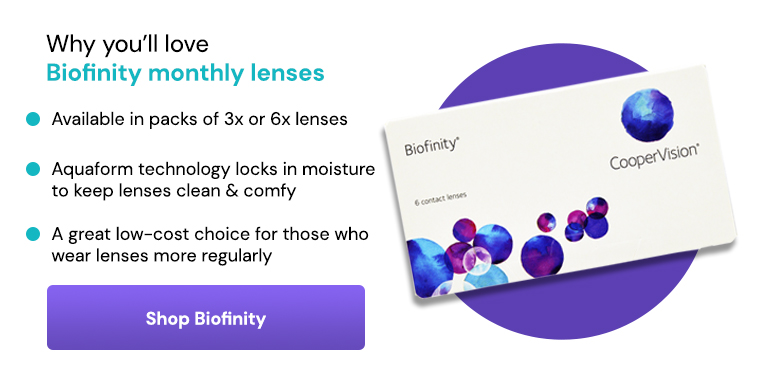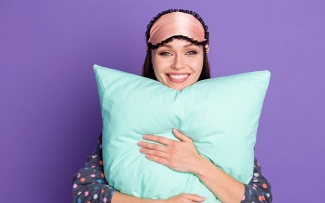Sleeping with contact lenses
Can you sleep with contacts in?
Contact lenses are an incredibly popular form of vision correction, used by millions around the world every day. They provide convenience above and beyond wearing glasses - but they also come with their own considerations to bear in mind.
One of those considerations is sleeping. Almost everyone would take their glasses off before sleeping, but when it comes to contact lenses, it might seem inconvenient to take them out, particularly if it’s just a nap. But sleeping in contact lenses can impact your eye health significantly, and it’s vital to be aware of whether you can wear your lenses to sleep and what effects that might have.
Roshni Patel BSC (Hons) MCOptom discusses the effects of contact lenses on your eyes during sleep, and how you can protect your vision.
Can you take a nap in contact lenses?
You should only nap in your contact lenses when you are wearing continuous (sometimes called extended) wear contact lenses. Made from a material tested and approved for wear whilst sleeping, this lens type should present no issues when napping.
Napping in contact lenses that are not designed for this can decrease the amount of oxygen your cornea (the front surface of your eye) needs to stay healthy. This puts you at greater risk of infections and corneal ulcers.
This is true whether sleeping for a short time or for extended periods.
Sleeping in contact lenses
If you would like to wear a contact lens you can sleep in, either overnight or just for a few hours, it is worth booking an appointment with your optician. They can assess your suitability for extended wear contact lenses and provide you with a trial.
Here at Lenstore, we offer free eye tests and contact lens checks for customers through our sister company Vision Express who carry out eye tests for our contact lenses customers. You can book this appointment at your local Vision Express through your Lenstore account online. Our Clinical Team will also be more than happy to assist in your booking over the phone.

Accidentally falling asleep in contact lenses
While you should always avoid sleeping in contact lenses that haven’t been designed for it, on occasion you may accidentally drop off while your contact lenses are still in.
If this happens, you need to be very careful about removing it. It’s likely that while asleep your contact lenses will become drier and tighter on your eye, causing discomfort but also increasing the risk of damage to your cornea when removing it.
Start by using contact lens rewetting drops to hydrate the lens. This may reduce discomfort and it’ll make the lens easier to remove.
Once the lenses are hydrated, continue to be cautious when removing them. Once out, you may wish to use hydrating eye drops on your eye as well to reduce any dryness.
You should then leave your lenses out for at least a few hours. If you encounter lasting discomfort or any visual issues, contact your optometrist as soon as possible to ensure there’s no damage.
Long-term effects of sleeping in contact lenses
Continuous-use contact lenses shouldn’t pose any issue when sleeping in them (if you are deemed suitable for them), however it’s still healthier to have your eyes clear of contact lenses whilst resting and have a few nights off from wearing lenses from time to time when sleeping in these types of lenses.
However, any sort of obstruction to your eye reduces oxygen to the eye, and even lenses designed for long-term use may cause problems over an extended period of time, as well as discomfort, dryness and increased risk of infection.
Protecting your vision
There are a number of ways you can protect your vision and encourage a good night’s sleep:
- Remove your contact lenses a while before bed. This will allow your eyes to rehydrate properly through blinking before you shut them all night.
- Eat a varied diet, rich in Vitamins A, C and E and antioxidants. A healthy diet will help support your natural sleep, while Vitamins and antioxidants will contribute towards maintaining your eye health. To ensure you consume all the necessary Vitamins check out our range of eye vitamins.
- Avoid looking at screens too long, and take regular breaks. Extensive exposure to light from screens can cause difficulty getting to sleep and resting efficiently, while looking at screens can also cause you to blink less - which can cause your eyes to dry out, especially if you wear contact lenses.
- Get regular exercise. Even going for walks can help. Stretching your muscles - particularly if you’ve been sitting at a desk all day - can help you sleep better, as well as provide fresh air and a chance to look at objects that are further away, which will both benefit your vision.
- Get regular eye tests. If your prescription changes over time, using the wrong prescription lenses or glasses can cause headaches and make it harder to sleep. Getting regular tests will ensure you’re always wearing the right strength of vision correction, and will spot any health concerns as early as possible.
- Reduce caffeine, alcohol, and nicotine. Regular use of these chemicals can affect your sleep and your health generally. While controlled amounts on occasion won’t have a major impact, taking too much on a regular basis can result in disrupted sleep and accordingly tired eyes.
By following these tips and taking care when using your contact lenses, you can protect your eye health for years to come.
For more information on sleeping with contacts please check out some of our other posts the science behind sleep and What's the Science Behind Lens Care & Wear?



